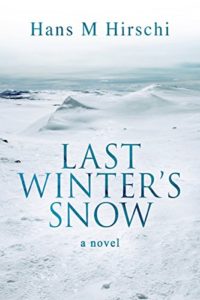Hans Hirschi’s Last Winter’s Snow Interview
Self-Publisher’s Showcase: Today we are joined by Hans M Hirschi, author of the newly-released Last Winter’s Snow. Welcome back to the Showcase Lounge, Hans.
Hans M Hirschi: Thanks. It’s good to be back! 🙂
SPS: For any of our readers that haven’t come across your work previously, can you take a moment to tell us all a little about yourself and your work?
HMH: I write (mostly) contemporary fiction from an LGBT point of view. I look at various social issues we deal with in our lives and societies, usually with a hopeful outlook.
SPS: What are your perfect writing conditions, and how often do you write?
HMH: Perfect writing conditions revolve around peace of mind (i.e. no financial or family worries) and lots of coffee. I write every day, although I don’t often write fiction. I blog, I have a Vlog and yeah, every now and then, when I get to that zone, I write. However, something needs to coalesce in my subconscious before that can happen.
SPS: Why do you think it is that you have found yourself writing in the style that you do?
HMH: I have a style? I don’t know, but I think invariably, all artists are a particular breed of mental. I had this conversation with a very nice Sami reporter just this morning, when she asked me why I, a non-Sami, would write about their culture. My response, that the character came to me, left her somewhat stunned, and I could tell through the static of the phone line how she found that hard to believe. Yet I’m not lying. My characters tell me what they feel I need to know, I just get to fill in the blanks…
SPS: What would you say, if anything, best differentiates you from other authors?
HMH: I have no idea. That is a really difficult question to ask. I know a great many authors and we all approach our art differently. I think what might make my writing unique is the combination of (sometimes) really difficult subjects with that unwavering optimism that permeates my books. They don’t call me the Queen of Unconventional Happy Endings for nothing…
 SPS: Last Winter’s Snow is your latest release. Was in a conscious decision to base it almost entirely in Sweden?
SPS: Last Winter’s Snow is your latest release. Was in a conscious decision to base it almost entirely in Sweden?
HMH: No, not at all. It all started out with the image described on the first pages of the novel. While I think this may have been a premonition of my own future, I never really intended the novel to play out here. But what do you do when your characters suddenly talk to you in Swedish?
SPS: The book covers the Sami culture and the loss of their lands, and their struggle to keep hold of their identity and religion, what made you want to cover their issues?
HMH: I think that when Nilas told me he was from this small town in Sápmi, and that he was Sami, I had no choice really, but to suck it up and learn about them. And as the story progressed, and they visited Sápmi several times, there was something inside me that was stirring, this need to research on site (which I’d never experienced before). By the time I was done with a first rough draft, the pull to travel to Sápmi was so strong that I almost got up and left instantly, forgetting anything I had planned for the holidays, including a Christmas cruise with my family. There was an incredibly strong force pulling me. It was not a conscious decision apart from needing to do Nilas and his people justice. Given the risk of cultural appropriation or stereotyping, I was really motivated to get it right.
SPS: We follow the relationship of Nilas and Casper from their first meeting in Stockholm. Did you draw on any personal experiences during any of the situations they face through the novel?
HMH: Yes and no. I never lived in Stockholm, and I didn’t move to Sweden until 1992. I think all authors do invariably pull from personal experience, one way or another, even when they write about far away star systems or weird creatures. We can’t just plug into someone else’s brain and draw from their experiences. So we use our own, stories we’ve heard, we make some up and shake or stir it, depending on preference. What the ingredients are in my books is for me to know. I don’t believe readers need to know the author to read and appreciate a story. But having lived through most of that time period (even though I’m a few years younger than Nilas & Casper), I’ve seen and witnessed much of what they go through, through friends, acquaintances, and myself.
SPS: How hard did you find it to write about the bigotry and discrimination that is prevalent, in particular, through the earlier part of their relationship?
HMH: Having been at the receiving end of some of that myself, it wasn’t particularly difficult to conjure up memories, or examples of things friends had been subjected to. What Nilas & Casper experience was pretty much life for a lot of gay men back then… Writing about it, so many years after the fact was – at times – like opening up old wounds. To try to emotionally (my writing is very much emotional) reconnect with events I’d almost forgotten wasn’t always easy. I needed a lot of debriefing afterward, often using my blog or my Vlog as a tool.
SPS: Your writing about the onset of the AIDS crisis is particularly enthralling. It comes across very well as it captures the feelings of the time. Did you do any additional research into the area?
HMH: You mean besides surviving it myself? Yeah. It’s “only” thirty years back, but as we grow older, we tend to forget much of the details of the timeline, the emotion of the time. I literally sat with an official “timeline” of the HIV-crisis on my screen while writing, because in those first years, things happened weekly, monthly, and I had to make sure to get it right. I was only sixteen when I first heard about AIDS, being seduced by a college boy. I had no idea what it was or how it was going to affect my life. Later, that same college boy contracted HIV. He’s one of very few people I know who are still alive from those days. When I was raped myself, in 1991, those weeks of waiting for the test results were some of the most harrowing of my life. Five weeks of thinking you would die, invariably, while being an even bigger outcast than you I already was, was not something I’d wish on anyone. Luckily, I tested negative. But that is an experience that stays with you.
SPS: Who do you feel the book would appeal to, and what would you hope they take away from reading Last Winter’s Snow?
HMH: I would hope – an illusion for sure – that anyone might enjoy to read it. But realistically, I think people with an interest in the fate of minorities, or indigenous people or recent history might enjoy it. I’m sure many in the gay community, men of my age or older might recognize what it was like to live back then, and how far we’ve come in a relatively short time. And it may also serve as a cautionary tale of what we stand to lose as societies, in the backlash we’re currently facing.
SPS: We’ve come to expect beautiful covers for your work. How did the latest come about?
HMH: I was standing on the very place where a key scene toward the end of the book takes place. But in reality it was January and not summer, and everything was a frozen wasteland. There are a couple of scenes where you see the boys look out over the horizon, where the white-gray sky blends together with the snow of the mountain ranges of Sápmi. That felt like a good picture. The amazing Natasha Snow took that input and turned it into this classy cover.
SPS: What’s next on the horizon for yourself?
HMH: These days, my books are all published by Beaten Track Publishing, a great British indie publisher of diverse fiction. However, just last week I released my first audio book, Family Ties, narrated by the insanely talented Michael Bakkensen, which is self-published, and I hope to be able to do another one before the end of the year. Since Beaten Track don’t do audio books, I self-publish those through Audible and their ACX platform.
SPS: If you could give one piece of advice for someone looking to get into writing, what would it be?
HMH: I don’t think that has changed since you last asked me that question. I would read a lot, write a lot, and get feedback, from someone whom you trust to be absolutely and 100% honest. Better to know early on that you suck (or not)! However, I would now also add, unequivocally, to never, ever publish anything that hasn’t been edited or proof read. And I don’t care if you’re the Great Bard or the curator of the English language itself; everybody needs an additional set of eyes to look at their writing! And yes, the exclamation mark is there on purpose.
SPS: Before we bring this interview to a close, it’s your chance to name-drop. Anyone who you feel is deserving of more recognition at present or someone whose writing you have recently enjoyed? Now is your chance to spread the word…
HMH: Oh… That’s a tough one, as there are so many great writers out there. I would definitely mention California resident Erin Finnegan, whose two first books (Sotto Voce & Luchador) have left me desperately hungry for more. There’s my fellow Swede Phetra H Novak, whose take on werewolves in Haven’s Revenge, intertwined with Norse mythology, is very fresh and unapologetic (even for someone who’s not usually a reader of paranormal fiction), and finally, to complete this triad of great talent, I’d mention British author Debrah Martin, whose recent transgender romance Chained Melodies left me in shambles.
SPS: Thank you for joining us again today, Hans, and all the best for the future.
HMH: Thank you for having me. Always a privilege!
SPS: For more information on Hans and his work, please do visit his author page, check out his 2013 interview, or pick up a copy of Last Winter’s Snow














Leave a Reply